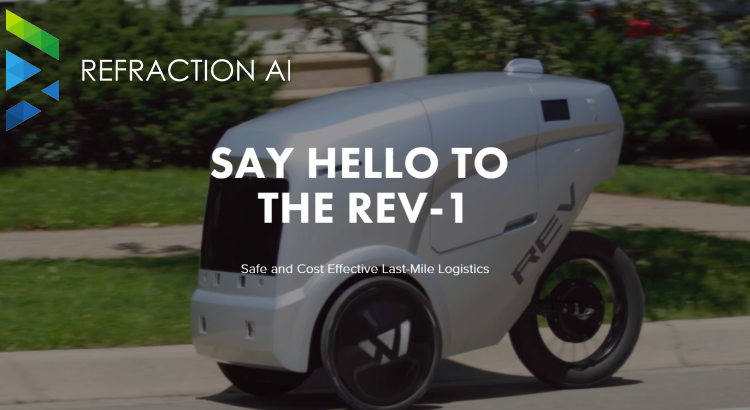Ann Arbor-based Refraction AI announced that it had raised a $4.2 million seed round-up. The startup debuted on the TechCrunch Sessions: Mobility Stage back in 2019, established by a duo of professors from the University of Michigan.
The professors were Mathew Johnson – Roberson – now CTO – and Ram Vasudevan, aiming to determine and resolve several problems faced by a large number of delivery robots. Their career has been focused on the development and data-driven optimization of robots.
The machine has been built for the core purpose of providing safe and scalable last-mile goods delivery in urban areas. To ensure maximization and safety, the REV 1 is light-weight and low-power, enough to qualify under e-bike regulations.
Refraction currently has 25 AI Robots in operation around Ann Arbor while making its new capital to start scaling up the business.
Say Hello to the REV-1
This delivery robot is said to have cost-effective last-mile logistics with safe delivery options. It picks up goods from places like restaurants, pharmacies, and grocery stores and brings the stuff directly to anywhere required, enabling cheaper yet faster delivery.
This robotic delivery startup gained traction during the pandemic, helping many restaurants save money on delivery costs. REV 1 is designed to operate on roads and bike lanes instead of the standard sidewalk ‘bot.’
To date, the company has successfully raised a sum of $10.7 million over more than two rounds. Last-mile delivery is an automation market having numerous starts and stops since 2017. It was the time when delivery robots got banned in San Francisco’s public streets.
The companies have worked with local governments since then in an attempt to enable the testing of autonomous delivery robots on public streets and sidewalks.
More particularly, Refraction AI continues to work with the government to determine the best way to roll out services while curtailing the effects to local communities.
Refraction AI’s main objective is to utilize this round of funding primarily to expand to other cities and other states. In addition, the company endeavors to continue investing in product development while expanding the platform’s opportunities.
Size and Weight
The REV 1 has a balanced size and weight, making a substantial difference in the way it operates while making the most capable street-worthy vehicle possible. It has complete built-in sensors making it capable of knowing where to go how long to stay.
Refraction is the safest and most light-weight vehicle out there with affordable sensors like cameras, enabling the machine to see, and we can stop on a dime to prevent accidents and other car tragedies.
2021, a pretty active year for delivery robots
A number of startups worldwide like Bizero, Ottonomy, and Delivers AI have come out of secrecy. Recently Safeway announced that it was piloting the utilization of Tortoise’s teleoperated robots for the delivery of groceries.
While, Kiwibot will soon begin its deliveries with Refraction AI Autonomous Robots, in Santa Monica, California, as part of that city’s zero-emission delivery zone, after passing a number of almost 1 million delivery milestones.
For cost effective and faster delivery, with no contact in the year 2021, Refraction AI Autonomous Robots brings promise of safer future.
